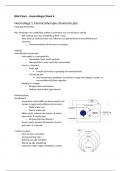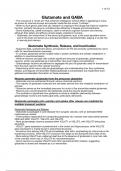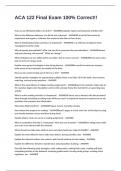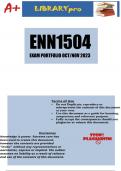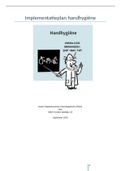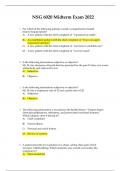Othello
Othello:
An integral part of the Venetian civic society for his military skills and leadership.
Being a black moor alienates him from the characters, setting and environment. According to the
Elizabethans, Othello was “unnatural”. This discrimination flared up his insecurities that paved the way for
Iago to easily convince him that Desdemona would go for a better, lighter, more civilized man.
His striking marriage to Desdemona defies society’s anti-miscegenation stance and goes “against all rules of
nature”.
At court, he speaks very sophisticatedly, abolishing all accusations of him being a “barbaric savage”.
“Arise, black vengeance” like lady Macbeth asks for supernatural aid to mess up with her nature.
Desdemona:
Had the power to choose to marry “the other” and defies her father, unlike Portia in The Merchant of Venice
that does not have a choice in the game of caskets.
16th century “maiden”. “Use Desdemona well”: possession.
Tragic waste that is sacrificed for a higher purpose.
Iago:
He displays elements of honesty to the characters and elements of deception to the readers, therefore
highlighting the motifs of duality of appearance versus reality and deception. By creating the paradox and
illusion of Iago’s “honest” character, Shakespeare stresses that everything is subject to perspective.
Iago tells Roderigo “I am not what I am.” and that even though he “seems” to “serve” Othello out of “love
and duty”, he only does it to “turn upon him”
Iago's diction is vulgar full of physical imagery that infuriate everybody and plosives that are effectively
explosive.
He swears by Janus, who is a Roman God represented having two faces.
Abuses Emilia his wife
He believes Othello has slept with his wife; therefore, he is on a mission to avenge himself, a wife for a wife.
He constantly compares himself to “Satan” on how he whispers poisonous lies in everyone’s ears.
do beseech you,
“Would you bear your fortune like a man!”, beasty perception of a man like lady Macbeth.
“ I confess, it is my nature’s plague to spy into abuses, and oft my jealousy Shapes faults that are not, that
your wisdom, from one that so imperfectly conceits, would take no notice, nor build yourself a trouble Out
of his scattering and unsure observance. It were not for your quiet nor your good, Nor for my manhood,
honesty, and wisdom To let you know my thoughts.”: despite confessing his devious nature, thanks to his
manipulative tone, Othello somehow still follows his words blindly.
Cassio:
Annoyingly naïve Florentine who thinks that everyone is kind and honest like the people in his hometown,
even Iago.
Othello:
An integral part of the Venetian civic society for his military skills and leadership.
Being a black moor alienates him from the characters, setting and environment. According to the
Elizabethans, Othello was “unnatural”. This discrimination flared up his insecurities that paved the way for
Iago to easily convince him that Desdemona would go for a better, lighter, more civilized man.
His striking marriage to Desdemona defies society’s anti-miscegenation stance and goes “against all rules of
nature”.
At court, he speaks very sophisticatedly, abolishing all accusations of him being a “barbaric savage”.
“Arise, black vengeance” like lady Macbeth asks for supernatural aid to mess up with her nature.
Desdemona:
Had the power to choose to marry “the other” and defies her father, unlike Portia in The Merchant of Venice
that does not have a choice in the game of caskets.
16th century “maiden”. “Use Desdemona well”: possession.
Tragic waste that is sacrificed for a higher purpose.
Iago:
He displays elements of honesty to the characters and elements of deception to the readers, therefore
highlighting the motifs of duality of appearance versus reality and deception. By creating the paradox and
illusion of Iago’s “honest” character, Shakespeare stresses that everything is subject to perspective.
Iago tells Roderigo “I am not what I am.” and that even though he “seems” to “serve” Othello out of “love
and duty”, he only does it to “turn upon him”
Iago's diction is vulgar full of physical imagery that infuriate everybody and plosives that are effectively
explosive.
He swears by Janus, who is a Roman God represented having two faces.
Abuses Emilia his wife
He believes Othello has slept with his wife; therefore, he is on a mission to avenge himself, a wife for a wife.
He constantly compares himself to “Satan” on how he whispers poisonous lies in everyone’s ears.
do beseech you,
“Would you bear your fortune like a man!”, beasty perception of a man like lady Macbeth.
“ I confess, it is my nature’s plague to spy into abuses, and oft my jealousy Shapes faults that are not, that
your wisdom, from one that so imperfectly conceits, would take no notice, nor build yourself a trouble Out
of his scattering and unsure observance. It were not for your quiet nor your good, Nor for my manhood,
honesty, and wisdom To let you know my thoughts.”: despite confessing his devious nature, thanks to his
manipulative tone, Othello somehow still follows his words blindly.
Cassio:
Annoyingly naïve Florentine who thinks that everyone is kind and honest like the people in his hometown,
even Iago.


